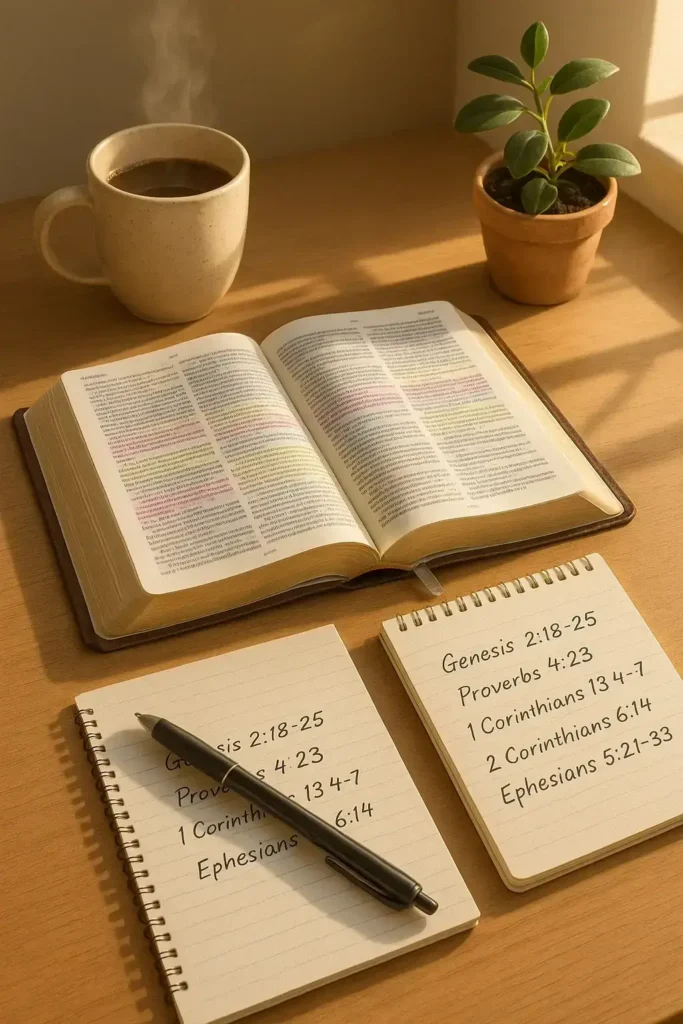Have you ever had a question about what the Bible says about dating in the world today?
You won’t find the precise term dating in the Bible, but what you will find are age-old principles that tell you exactly what to do regarding romance, relationships, and marriage. The Bible presents a guideline of love, values, holiness, wisdom, and commitment that can guide us in our choice of a marriage partner and how to define boundaries and honor God in the process.
Being a believer who has both studied the Bible and walked with others through their dating endeavors, I have witnessed that relationships have the ability both to bring them closer to God and to turn them away. This is why we must establish our love lives on biblical principles.
In this guide, we will examine what the Bible does and does not the Bible support about dating, and how you can use a God centred framework in your relationships.
Check Also: Are You Dating the Right Person?
Biblical Foundations for Christian Dating

When I crack open the Bible, there is no chapter on 21st-century dating. What we shall discover, however, are unchallengeable facts which provide a solid, God-glorifying basis. These are facts, not a recommendation; they are the divine principles by which all the phases of our relationships have to be built.
The question most Christians struggle to answer is when is it right to say I love you or even when is it right to date. In case this is what is in your head, our guide on what the bible says about dating would be of considerable use to you.
The Bible sets standards for love and respect in dating. Those principles also apply in marriage, especially when facing an emotionally abusive husband.
Marriage as God’s design and goal
“A man shall leave his father and mother and be joined unto his wife, and they shall become one flesh,” is the first time that God’s voice is heard in Genesis 2:24.
Dating is not supposed to be a loop of having a random relationship; it is about finding out whether a person can be your marriage partner. The covenant is marriage, and dating is the path to it.
Use of dating that is not focused on marriage leads to heartbreak.
A Christ-centered relationship keeps the goal in focus from the start.
The call to holiness in relationships
1 Corinthians 4:3-5 According to Paul, “It is God’s will that you be sanctified.”
Which means dating should move you closer to Heaven, NOT further. Holiness isn’t just about your body; it’s your mind, your deeds, and your purposes.
- Are your conversations building each other up spiritually?
- Are your actions pointing toward Christ or compromise?
God’s definition of love
1 Corinthians 13 defines love as patient, kind, selfless, and enduring. Worldly love can be demanding, controlling, or just dies when the going gets tough, but Godly love is sacrificial to do what is best for the other party.
- Patience will imply having no rush into intimacy.
- Charm implies that you talk graciously, despite disputes.
- Selflessness means prioritizing one’s spiritual health over one’s intended emotional health.
Guarding your heart with wisdom
Proverbs 4:23 states that you should put your heart first because that is where life’s problems originate.
The fountain of your life is your heart, and when you allow a wrong person or influences to penetrate it, your whole spiritual life may be involved. Protecting your heart is not keeping it shut, but you have to be cautious of the people you share your innermost feelings with.
- Peace praying is one thing, but before you open up, do it.
- Take care that trust does not come suddenly.
Seeking godly counsel in dating
According to Proverbs 15:22, plans fail because of a lack of counsel, and with many advisers they work.
Dating is never to be carried out in a vacuum. Considering the input of mentors, pastors, or your favourite friends provides an external point of view at the moments when emotions may cloud your judgment.
- Shrewd advice will see warnings you would not.
- Spiritual leaders can pray over your relationship and work with the Bible.
When you make use of these biblical grounds, dating ceases to become a guessing game. You’ll have a compass; God’s Word, to navigate modern relationships without losing sight of His design.
Read Also: Dating Tips & Advice for Men
What the Bible Doesn’t Specifically Say About Dating

When we read the Bible, you and I will be tempted to yearn for black and white solutions to all the contemporary problems. Now this is the reality of the Bible: it was written during a culture, in a time, which had no dating apps, no prom nights, no long-distance texting relationships. This does not imply the Word of God is outdated, but just that we and I need to transfer the timeless principles of God to the realities of the present.
Read Also: Free Dating For Disabled People
Although Scripture provides us with definite ethical rules, it does not list out all of the practicalities. What it does not specify, let us see:
No set “dating age” in Scripture
In the bible, there is no such command as, You may date at the age of 18.
- Marriages used to occur at an early age in agricultural societies in biblical days.
- Maturity levels differ, and legal age varies depending on the country.
- The principle is maturity in faith, not a set birthday.
How long should you date before marriage
The bible does not provide you with a schedule, such as engage after six months or three years.
- There are godly couples who knew in several months; some took years to unravel God’s leading.
- It is not about comparing yourself to a journey, and discernment is a factor based on prayer.
Different ways Christians can meet a spouse
There is never one prescribed way of meeting a spouse in the Word of God.
- In ancient times, arranged marriages were common.
- There were friends, introductions by relatives, and even intercultural marriages.
- In our day, meeting through church, mutual friends, or even online can all be valid, as long as you’re seeking God’s will.
Communication styles and modern technology
The Bible does not say how often to text back, call, or video chat.
- Technology is a device; it may construct relationships or bring dependencies.
- It is of the essence to use it in a healthy manner that promotes godly communication and not temptation or burnout of emotion.
Physical boundaries in dating relationships
- That is where wisdom, conscience, and accountability interfere.
- One couple’s threshold of safety can be another’s temptation.
Cultural traditions vs. biblical principles
The Bible is silent on the protocol of the first date, on exchanging gifts, or paying for dinner.
- They are just habits of the culture, and not laws of the Bible.
- The rule is that one has to respect, be generous, and decent regardless of tradition.
Read Also: What Happens If You Divorce a Disabled Spouse?
A Biblical Framework for Dating

Over the years of walking with young adults, in my study, and prayer, I have developed a basic outline that helps to have God at the forefront and emotions in their human position. It is not hard and fast rules I am giving you, but wise rails so that you can travel on into life with peace, purpose, and clarity of thought.
Though biblical advice may assist in coping with feelings of early dating, it is important to know how love should evolve naturally. Read How Long Can It Take To Fall In Love? to find out more.
Step 1: Preparing your heart before dating
Before you date, you and I both need to be spiritually grounded and emotionally honest. Dating magnifies what’s already inside.
- Soul inventory: I ask, What do I want from dating: validation, comfort, or Christlike partnership? You can ask the same.
- Daily formation: Scripture, prayer, and worship aren’t “extras.” They’re oxygen (Ps. 119:105; Matt. 6:33).
- Gauze the wound: Unresolved grief, betrayal, or anger should be healed before allowing anybody into that tempest (Prov. 20:5).
- Contentment check: When I think that romance is the thing that will lastly complete me, I am placing my future mate in a position of idol (Phil. 4:11-13).
- Simple prayer to start: “Lord, align my desires with Your will. May holiness and courage and patience increase in me. Amen.”
Step 2: Identifying your values and non-negotiables
Convictions are rails; preferences are scenery. Know the difference before feelings speak louder than wisdom.
- Faith alignment: I ask, Do we follow the same Jesus, the same gospel? (2 Cor. 6:14; Amos 3:3).
- Purity posture: Not just “how far,” but how holy (1 Thess. 4:3–5; 2 Tim. 2:22).
- Calling & direction: Do your mission and theirs fit to run side by side in the long run?
- Character core: seek people who demonstrate sincerity, humbleness, teachability, and repentant hearts (Col. 3:12-14).
- Write it down: Identify five that can be changed (preferences), and five that cannot be changed (convictions).
Step 3: Inviting community and mentors early
Lone-wolf dating breeds blind spots. I involve wise people from the jump.
- Give your circle a name: One friend with spiritual maturity and one mentor.
- Invite real feedback: “Would you meet them? Tell me what you notice.” (Prov. 11:14; 15:22).
- Pray together: Ask your community to pray with you and for you monthly.
- Stay transparent: Hidden dynamics usually grow unhealthy. Light heals (Eph. 5:8–10).
Step 4: Meeting intentionally and pacing wisely
Dating is discovery, not performance. Curiosity beats chemistry alone.
- Weeks 1–4 (light + honest): Two short dates a week max; ask value-shaping questions: family, faith, money, service.
- Varied settings: Worship together, serve together, do a practical task together (grocery run, volunteer shift). Character shows under small pressure.
- Guard the accelerator: Don’t over-share trauma or map baby names by week two. Let trust earn access.
- Green lights: Peace, consistency, respect for boundaries. Yellow lights: Fast intensity, future-faking. Red lights: Control, secrecy, contempt.
Step 5: Setting healthy boundaries (physical, emotional, digital)
It is not the fences that keep love out, but the lines that have directed love to the correct path.
- Physical: Agree ahead of time what you’ll do and what you won’t (Heb. 13:4). Choose public or accountable spaces. Set a “curfew” that honors self-control.
- Emotionally: Share history in layers. Align the level of commitment with the level of disclosure.
- Digital: No private disappearing messages. No late-night “emotional dump” texting. Keep devices out of bedrooms after a set time.
- Social media: Don’t soft-launch what you haven’t prayer-launched. Post with prudence.
- Boundary script: “I care about honoring God and you. Here’s what feels wise for me physically and emotionally. What feels wise for you?”
Step 6: Testing compatibility in real life

Spiritual chemistry matters, and so does calendar, budgets, and conflict styles.
- Money: Negotiate on giving, saving, debt, and spending behaviours. Are you able to plan a simple budget without drama (Luke 14:28)?
- Work & calling: Hours, travel, ambition, ministry, do these harmonize?
- Family vision: Views on marriage roles (Eph. 5:21–33), kids, in-laws, holiday rhythms.
- Conflict style: How do you both apologize? Can you disagree without disrespect (James 1:19-20)?
- Health & history: Share essentials that affect future life, honestly and early enough to be fair.
- Logistics: Distance, church home, future location. Love thrives when plans are realistic.
- Mini “labs” to test fit: Cook a meal under time pressure, serve at church together, take a day trip with a hiccup (missed turn, long line), and watch teamwork.
Step 7: Communicating with grace and truth
Christlike communication is both grace and truth (Eph. 4:15). It’s learned, not luck.
- James 1:19 rule: Hear much, speak little, get angry slowly.
- Make use of “I” statements: instead of saying, “You never think I exist,” say, “I felt left behind when plans were changed at the last minute.”
- Fix quickly: “I am sorry about my tone. I was defensive. Will you forgive me?”
- Decide well: Pray → discuss → decide → review in a week.
- Texting hygiene: Keep complex conversations for in-person. Text to plan, not to process.
- No manipulation: No silent treatment, score-keeping, or sarcasm-as-weapons. That corrodes trust.
Step 8: Discernment checkpoints in your relationship
Wise couples pause on purpose.
- 30-day check: Are we becoming more like Jesus together?
- 60-day check: Do mentors affirm what they see? Any recurring yellow flags?
- 90-day check: Are direction, values, and rhythms aligning, or straining?
- The peace test: Is your prayer life calmer or noisier (Phil. 4:6-7; Col. 3:15)?
- Fasting day: Once a quarter, fast and pray separately, then compare what you sensed.
- Data over drama: Track patterns, not isolated moments. Character is a trend line.
Check Also: Are You Falling in Love With the Wrong Person?
Step 9: Moving toward engagement with wisdom
Engagement is a public display of discernment; it is not a destination.
- Readiness signs: Shared convictions, practiced boundaries, healthy conflict repair, aligned direction, strong community support.
- Premarital counseling: Start before the ring or immediately after. Talk about roles, communication, finances, spiritual rhythms, and family of origin.
- Transparency packet: Share budgets, debts, health realities, and non-negotiable life plans. Secrets sink marriages; light saves them.
- Keep honoring purity: Engagement heightens temptation. Double down on boundaries and accountability.
- Timeline wisdom: Shorter, focused engagements often protect unity and momentum.
Step 10: Ending relationships with honor when necessary
Sometimes the godliest step is goodbye with dignity.
- Clarity cues to end: Repeated boundary violations, spiritual drift, chronic disrespect, deception, or divergent callings that won’t reconcile.
- Create the dialogue by approaching a private, secure location first. Be positive, gentle, and concise: “I thank you for: Based on prayer and counsel, I don’t see marriage peace here.”
- No post-breakup spin: Don’t crowdsource the story or shade them online (Rom. 12:10).
- Feed your soul: Include mentors, take a break on social media, seek out counseling where necessary, and leave God to rebuild (Ps. 34:18).
- In case you share a church: Separate seats, do not serve together on teams, and make leaders guide you through space and peace.
Read Also: 7 Qualities Of A Healthy Relationship
Key Scriptures About Dating and Relationships

Genesis 2:18–25 (Marriage as God’s design)
God instituted marriage as a union between one man and one woman to be characterized by unity, intimacy, and partnership. It is more than companionship; it is a projection of His relational character.
Proverbs 4:23 (Guarding your heart)
Life springs forth out of your heart. Shield your thoughts, emotions, and desires by keeping them with God’s truth, this is especially in dating.
1 Corinthians 13:4–7 (God’s definition of love)
Love is patient, kind, gentle and forgiving, and persevering. This is the one we use as the gold standard of how to treat one another in our relationships.
2 Corinthians 6:14 (Being equally yoked)
Followers are charged to come together with those who hold on same ideology. Harmony of the soul is a prerequisite for a life-long partnership.
Ephesians 5:21-33 (Love and respect in marriage)
A mutual submission with husbands trying to love sacrificially and wives trying to respect wholeheartedly is a good marriage that resembles Christ and the church.
Love Compatibility Calculator
Future Wedding Date Predictor | Jealousy & Trust Score Test | First Kiss Date Finder | Breakup Probability Calculator | Who Says “I Love You” First? | Long-Distance Survival Score | How Toxic Are You? Test | Red Flag Detector | Who Loves More? Love Test | Should I Block My Ex? Test | Ex Comeback Calculator | Situationship Meter | Who’s More Annoying? Test
Read Also: What Is October 1st For Relationships?
FAQs:
What is biblical dating?
Dating with intention, keeping God first, and looking for marriage.
Is premarital dating a sin?
No, unless it leads you away from God’s ways.
Is dating allowed for Christians?
Yes, but of course, when we do this, it must be done with respect, the purpose and honor of God.
Does the Bible say when you should start dating?
The Bible doesn’t give an age, only when you are spiritually and character mature.
Final Words:
Courting in contemporary society is like going through a maze. Lines continue to blur in this ever-evolving world with mountains of possibilities, socially-adjusting attitudes, and pressures in both social and peer groups. However, when we go to the Bible, the mist is dispelled. The Bible might not prescribe prom attire, texting etiquette, and marriage proposals, but it does hold things that never get old: honor God, take care of your heart, seek holiness, and treat people with love and respect.
These principles are not merely good advice, but they are God designed principles of relationships that can build us up instead of bringing us down.



Pingback: Native American Dating Online - reallovetips.com
Pingback: Dating Tips & Advice for Men - reallovetips.com
Pingback: Is October 1st Really Couples Day? - reallovetips.com
Pingback: What Is October 1st For Relationships? - reallovetips.com